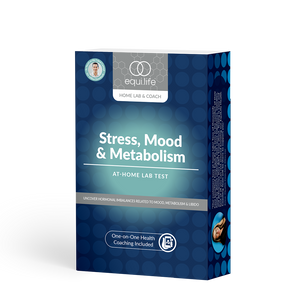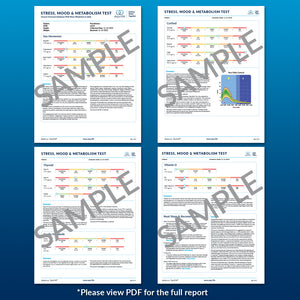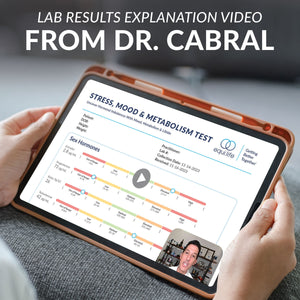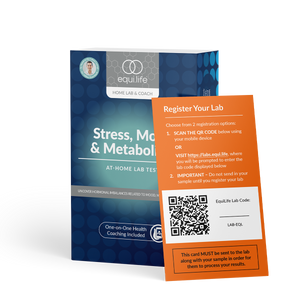



If you're dealing with low mood or libido, slow metabolism or just feel you've lost your mojo it's absolutely vital to look at your hormones. The Complete Stress, Mood & Metabolism test gives you the full picture to identify any imbalances directly affecting overall metabolic function. As we age, it's even more important to keep hormones in check in order to manage stress effectively, maintain a healthy weight and have the energy you need. If you've struggled to lose weight and keep it off, this test takes all key hormones into account: thyroid function, adrenal output, blood sugar and vitamin D status.
You will received a video from Dr. Cabral that will provide you with a detailed explanation of how to understand your individual results.


If you feel like no matter how hard you try you still can't seem to lose weight or keep it off, even after following rigorous diet and exercise regimes, it's time to take a closer look at your hormones and finally understand the root cause of the challenges you may be facing. The truth is our weight can dictate how we feel about ourselves and our health. If your goal is weight loss, it is important to know it often has less to do with daily caloric intake or how much you exercise and everything to do with hormone balance: cortisol (stress), thyroid, blood sugar (insulin) and hidden inflammation that adds even more stress to your system and this metabolism test does all that and more. There's no denying hormones play a pivotal role in how you feel; the problem is that being a bit too high or too low, or not in the right ratio with counter balancing hormones can send you into a spiral of metabolic dysfunction. Low mood, low libido, low energy, weight gain, puffiness, thinning brittle hair – there is always a reason. To restore vital hormonal balance and optimize your metabolism, The Complete Stress, Mood & Metabolism Test will give you the detailed, accurate measurement of key hormone levels with further assessment that offers real meaning on how to rebalance your hormones.
Maintaining an ideal weight can be difficult despite your best efforts with diet and exercise. What many don't know is that an undetected hormone imbalance can be the missing link making it harder than it needs to be to stay slim. When it comes to regulating mood, weight management, metabolism, blood sugar regulation and also when and where the body stores fat, hormones are the key players. As we age, natural changes in hormone levels can trigger many symptoms of imbalance – including unexplained weight gain. The Complete Stress, Mood & Metabolism test will identify your specific underlying hormone imbalances associated with excess weight gain, thyroid issues, chronic stress, vitamin D deficiency and lowered mood. With the expertise of a certified Health Coach and armed with the appropriate diet, lifestyle and supplement plan right for you, you'll be on the best path to rebalance your hormones and finally get the results you've always wanted. Rebalance your hormones to allow you to live a life full of passion, energy and vitality!
The two most important hormones in the female body, individual levels as well as the ratio Pg/E2 - a key indicator of estrogen dominance
Estradiol (E2) is the primary form of estrogen created in the ovaries and also in small amounts by the adrenal glands and fat cells.
Optimal levels in women promote a healthy distribution of fat in the hips, thighs, breasts and subcutaneously. Excess estrogen, coupled with low progesterone can lead to unhealthy surplus weight gain in these areas.
Sufficient levels of vitamin D, estrogen and testosterone are important for maintaining bone health in the menopause years.
Men generally have much lower levels of estradiol and higher testosterone than women. In overweight men testosterone levels drop and estrogens rise creating the same problematic weight gain in the hips, thighs, and breasts (gynecomastia).
Progesterone (Pg) is the hormone crucial for menstrual cycle regulation and pregnancy maintenance.
Progesterone is produced mainly in the ovaries following ovulation each month.
Low progesterone is common due to high stress when the body will produce more cortisol instead of progesterone, which has an impact on the reproductive system.
Adrenals under pressure create imbalances of other hormones, e.g., stealing progesterone away from its reproductive duties to make extra cortisol, or inhibiting thyroid function and metabolism.
The individual level of estrogen and progesterone are key, but the ratio is as important to assess.
A low ratio occurs when progesterone is low relative to estrogen commonly known as estrogen dominance.
Imbalances in these two hormones can lead to weight gain in the hips and thighs, water retention and a sluggish metabolism.
In general, either decreasing estrogen and/or increasing progesterone are appropriate.
Key sex hormones (androgens)
Testosterone (male dominant) and DHEA are key sex hormones that increase lean muscle mass and metabolic rate. Androgens are key factors for hair health.
Testosterone can be elevated in women due to stress and or PCOS.
Dehydroepiandrosterone (DHEA) is a hormone that your body naturally produces in the adrenal gland. DHEA helps produce other hormones, including testosterone and estrogen. Natural DHEA levels peak in early adulthood and then slowly fall as you age.
Low testosterone and low DHEA can lead to decreased muscle mass with a corresponding increase in body fat, decreased metabolic rate & excess abdominal weight gain. Low levels can also reduce vitality and exercise tolerance.
In women with polycystic ovarian syndrome (PCOS), high testosterone and DHEA are linked to insulin resistance and weight gain, particularly around the middle.
Sufficient levels of vitamin D, estrogen and testosterone are important for maintaining bone health in the menopause years.
Produced by the adrenal glands to keep up with our daily stress response
Adequate cortisol production is essential to function optimally, both chronic over or under-production can lead to a wide range of health issues over time.
Under stress, excessive cortisol production particularly in connection with insulin, can promote fat storage in abdominal fat stores. This visceral type of fat is closely associated with insulin resistance and metabolic syndrome.
Chronically elevated cortisol is a known risk factor for pre-diabetes and cardiovascular disease.
Low cortisol can lead to chronic fatigue, low energy, food and sugar cravings, poor exercise tolerance or recovery & low immune reserves.
Vitamin D is actually a hormone mainly produced when our skin is exposed to sunlight
Adequate levels of active vitamin D3 can help support hormone balance.
Deficiency can be associated with hyperinsulinemia (excess insulin), increased belly fat and skin issues like psoriasis and acne.
Sufficient levels of vitamin D, estrogen and testosterone are important for maintaining bone health in the menopause years.
Vitamin D levels within the optimal ranges have been found to be associated with a decrease of many conditions including autoimmune diseases and cancer.
Comprehensive analysis of all thyroid markers T4, T3, TSH, TPO antibodies to get a complete picture of thyroid health and function
The thyroid is a small butterfly-shaped gland that sits behind and below the Adam's apple. A wide range of factors from hormone imbalances to mineral deficiencies and environmental pollutants can interfere with thyroid production, leading to a wide range health problems.
Levels of key thyroid hormones can indicate whether there is a thyroid imbalance. Our bodies produce several thyroid hormones, but two are absolutely essential: thyroxine or T4, the most abundant in the body; and triiodothyronine or T3, the most active of the two. The others are also important for optimal health.
Elevations, even within the high-normal range, can be linked with hypothyroidism, low metabolic rate and obesity.
Hypothyroidism is also linked to elevated cortisol levels that can increase the production of binding proteins that reduce thyroid hormone bioavailability.
Stress and blood sugar regulation
Insulin is a hormone created by your pancreas that controls the amount of glucose (sugar) in your blood at any moment. It helps store glucose in your liver, fat and muscles and also regulates your body's metabolism of carbohydrates, fats, and proteins.
With prolonged stress, adrenal hormones can start fluctuating up and down, triggering blood sugar and insulin imbalances, food cravings, weight gain and sleep disturbances.
Insulin resistance can occur from prolonged elevated blood sugar levels where your body is no longer able to effectively respond to insulin, making it unable to fully absorb and use the sugar from the food you eat for energy. This can lead to type 2 diabetes.
Hemoglobin A1c (HbA1c) is a measure of red blood cell hemoglobin glycation and reflects the average blood glucose for the previous 3 months.
The American Diabetic Association recommends the following HbA1c levels:
Normal: <5.7%
Prediabetes: 5.7% - 6.4%
Diabetic: >6.5%
EquiLife labs are designed to provide detailed and thorough information so that you can understand your health at the deepest level, allowing you to finally get to the root cause of your biggest health concerns.
Testing takes the guesswork out of your health and empowers you to make informed choices about your health. Along with your lab results will be a video by Dr. Cabral which provides you with a detailed explanation.r goals.
To ensure you feel confident about your lab findings, at your request EquiLife offers 1-on-1 Health Coaching support to review your results with you and answer any questions you may have.
Get to the Root Cause
Once you receive your at-home lab test, please follow the instructions provided to register your test. Once sample(s) are sent to one of our CLIA certified labs, it will take approximately 3 weeks for your results to be returned, during which time you will receive a lab results explanation video from Dr. Cabral.
All at-home lab tests expire 6-months from their purchase date. To ensure you will receive your results, please be sure to send all samples for completed lab tests prior to the 6-month expiration date. Unfortunately, there can be no returns or replacement lab tests sent after the 6-month time frame.
Please remember to register your labs prior to sending your sample to the laboratory.
We have compiled thorough FAQs for our at-home lab tests, which you can browse here:
https://faq.equi.life/en-US/articles/lab-kit-faq-14490
For additional questions, you can contact us at support@equi.life.



